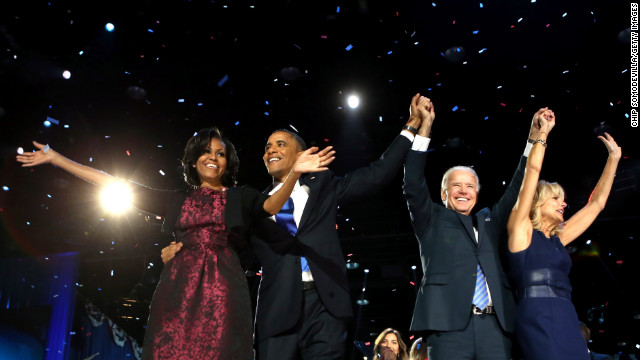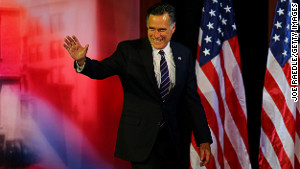Five things Obama must do
November 7, 2012 -- Updated 0828 GMT (1628 HKT)

Obama, Biden celebrate in confetti cloud
STORY HIGHLIGHTS
- Elaine Kamarck: In his second term, there are five immediate challenges for Obama
- She says he must find United States' footing in fragile Arab world
- Kamarck: He must reach a grand bargain with GOP to avoid fiscal cliff
- Kamarck: He must find way to deal with fractious Republican party; confront climate change
Editor's note: Elaine
Kamarck is a lecturer in public policy at the Harvard Kennedy School of
Government. She has worked in five Democratic presidential campaigns and
in the Clinton/Gore White House and is the author of "Primary Politics: How Presidential Candidates have Shaped the Modern Nominating System".
(CNN) -- Now that the campaign is over and Barack Obama has won a second term,
the hard business of governing begins again. There's a presidential
inbox waiting and it's not too hard to figure out what's in it. Problems
don't have Democrat or Republican stamped on them: they just are. So
here are my top five issues facing the president.
Finding our footing in the new Arab world
Obviously this election
was about the economy first, second and third. But the world intrudes.
Our election campaign did not keep terrorists from killing American
diplomats in Benghazi, nor did it stop the violence in Syria. When all
the ballots are counted and the parks swept clean of the debris from
election night rallies, President Obama will have to figure out what is
happening in this very volatile part of the world and what, if anything,
we do about it.

Elaine Kamarck
We intervened in Libya to
get rid of an awful dictator, but so far we have not intervened to get
rid of the awful dictator in Syria. As the violence escalates and the
Syrian president wreaks ever more death and destruction on his people,
will we be drawn into an intervention there too? After 9/11 we went to
war with Iraq over a mistaken fear of nuclear weapons. Is Iran
developing nuclear weapons or are we wrong to be concerned? Will we go
to war with Iran too?
Preventing the fiscal cliff
While President Obama has
been crisscrossing the country looking for votes, the people left
behind in Washington have been wringing their hands over the dangers
posed to the fragile economic recovery by the severe combination of
spending cuts and tax increases that are due to kick in on New Year's
Eve. This so-called "fiscal cliff" was the result of politicians kicking
the can down the road a few years ago. Will they do it again? Or will
there be a grand bargain that actually puts the country on the path to
smaller deficits?
There are plenty of plans
on the shelf waiting, including those put together by the big deficit
reduction commissions such as Simpson/Bowles and Rivlin/Domenici. And
there's the plan almost put together by President Obama and House
Speaker John Boehner. The problem isn't the lack of plans; it's the lack
of courage. The outlines of any deal have been clear for some time now:
Democrats have to give up some spending, especially on entitlements
like Social Security and Medicare, and Republicans have to allow for
some new taxes. Each side has to hold it's nose if a deal is to be done.
Which brings me to the next issue facing President Obama:
Dealing with the Republicans
Obama must figure out
how to deal with a Republican Party in Congress that has become
dysfunctional. In 2010 a relatively small group of voters calling
themselves the Tea Party launched a surprise attack on the leadership of
the Republican Party. Under President Bush, the Republican Party had
gotten a little too fond of world domination and a little too dismissive
of the party's traditional concern for fiscal discipline. Frankly, they
deserved a trip to the woodshed.
But once their new
majority in the House of Representatives was won, the leadership
overreacted, and rather than forge a majority that could perhaps make
some progress, they cowered before their new members like frightened
children. The result? No progress. If the Republican leadership
continues to tremble before their most radical members, the entire party
risks a rightward slide off the face of the earth. And President Obama
will have to figure out how to work around them.
Cutting a deal on tax reform
It's been 25 years since
a Democratic Congress and President Reagan cleaned out the tax code and
achieved lower rates and fewer loopholes. But tax loopholes grow back
like dandelions in the garden. The current tax code is a mess. It
rewards some sectors of the economy and not others. It distorts business
decision-making and it makes sure that those who don't need it have
plenty of tax deductions. It's time to weed that garden once again.
 Election 2012: The best photos
Election 2012: The best photos
 Romney concedes election
Romney concedes election
Amazingly enough in this
era of extreme polarization, both presidential candidates have
expressed support for lowering the corporate tax rate to 25% and
simplifying the corporate side of the code. It's possible that they
could agree on the easy stuff on the corporate side and move to the
harder stuff on the individual side. Tax reform will be part and parcel
of a long-term deficit deal. Tax cuts for the oil and gas industry are a
favorite target of President Obama, and they are just one example of
many industry-specific tax breaks that might get swept up in a big tax
deal.
Climate change
And finally I come to
the issue that was not mentioned in the presidential campaign: climate
change. The Democrats' one attempt at climate change legislation died in
2010, a victim of the recession and also of the fear that confronting
it would increase energy costs on a public still reeling from the
meltdown. The failure of the climate bill began, however, the issue's
long, slow slide into oblivion; a slide so complete that both candidates
spent their debates falling all over themselves to prove they were
friends of coal.
But coal is the big
culprit in climate change, a fact conveniently ignored when the votes of
Ohio are at stake. How fitting then, that in the very last week of the
campaign, a gigantic hurricane would destroy the Jersey shore and close
down lower Manhattan. The seas are rising after all; there is something
happening after all. What, President Obama, are you going to do about
it? The options are plentiful, from taxing carbon to pouring more money
into green energy. They just haven't been very palatable. Maybe
hurricane Sandy can change that.

ไม่มีความคิดเห็น:
แสดงความคิดเห็น